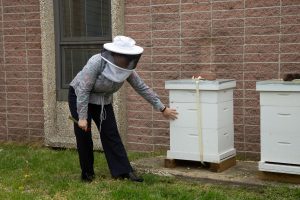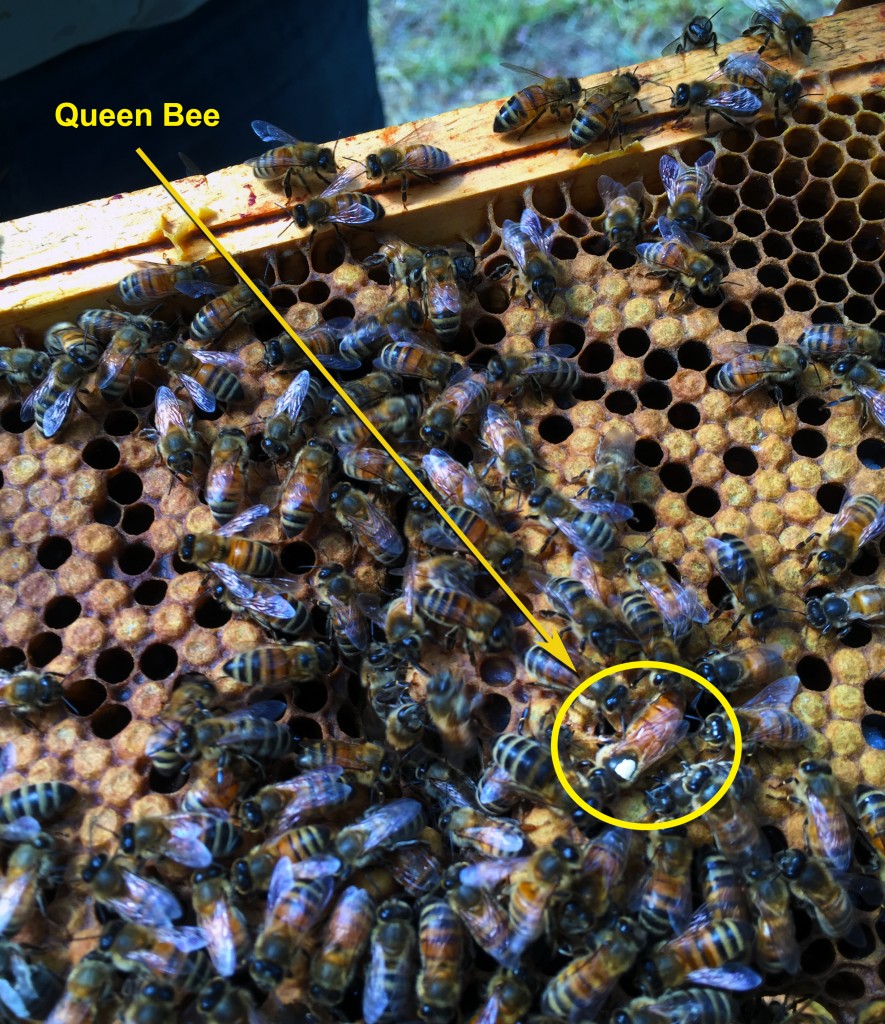DOVER, Del. – Farmers throughout Delaware depend on both honeybees and native bees to pollinate their crops each year. It takes nearly 300 million honeybees to successfully pollinate these crops, which bring more than $38.7 million to the state’s economy.
“The health of pollinators within Delaware is extremely important to the success of our family farms,” said Secretary of Agriculture Michael T. Scuse. “From early spring all the way through late summer, bees are pollinating crops that Delawareans love to eat – strawberries, blueberries, watermelon, cantaloupes, cucumbers, apples, squash, cranberries, and pumpkins. Our staff works throughout the year to ensure the safety of bees and to help increase the number of healthy colonies within the state.”
In 2016, the Delaware Department of Agriculture (DDA) released

Delaware’s Managed Pollinator Protection Plan that outlines strategies, best practices, and resources that beekeepers, farmers, landowners, and pesticide applicators can use to help protect and enhance bees and other pollinators. In conjunction with the release of this plan, the Department’s Plant Industries section secured a USDA Specialty Crop Block Grant to engage Delaware fruit and vegetable growers and beekeepers in the implementation of the plan to improve the availability and quality of bee forage and to decrease the bees’ risk of pesticide exposure. Both efforts combined to improve the health and vitality of bees, which in turn enhance pollination of crops and also enable increased production of local honey.
“One of the key best management practices that we learned in talking with all the groups involved in developing the pollinator protection plan is communication,” said Laura Mensch, DDA Hydrologist III. “We invested in DriftWatch so that pesticide applicators could check where beekeepers have their hives located before spraying – either on the ground or by aerial application. We are excited to see the recent release of the mobile DriftWatch apps, increasing the potential use and benefit of the tool.” In April 2018, FieldWatch launched two free mobile apps (both Android and iOS) called FieldCheck and BeeCheck. The goal is to make it easier for users to access the DriftWatch map while they are on the go. These new apps will allow more users, especially applicators, to access the specialty crop and beehive data on a highly functional mobile platform.
DDA asks beekeepers to register with BeeCheck so that pesticide applicators know where hives are located when they head out to spray. According to DDA State Apiarist Meghan McConnell, there are 289 registered beekeepers with 5,934 colonies in-state for 2018, but there are only 77 beekeepers registered with BeeCheck. One of those pesticide applicators is the Department of Natural Resources and Environmental Control’s Delaware Mosquito Control Section. For public awareness, including beekeepers, the Mosquito Control Section implemented a Spray Zone Notification (SZN) System, enabling a registered user to receive an alert via text, phone, or email of upcoming spray activities. Recently, two beekeepers expressed concerns regarding mosquito control aerial spraying in Sussex County and alleged impacts to the health of honeybees used for pollination there. Neither had registered with the Spray Zone Notification System.
The Mosquito Control Section’s primary work is preventing mosquito-borne diseases in humans, domestic livestock, and pets, and helping promote and maintain good quality-of-life for Delawareans and visitors, while also lessening adverse impacts to local economies that severe mosquito infestations can cause. Nineteen of the 57 mosquito species found in Delaware are known to bite humans and several can transmit mosquito-borne diseases such as Eastern equine encephalitis and West Nile virus. In particular, the native common house mosquito is primarily a nighttime biter but is also active around dawn and dusk, and is the primary transmitter for West Nile virus in Delaware.
Eliminating breeding habitat is the best means of controlling several types of mosquitoes, but control of other species that can also transmit disease or severely affect quality-of-life often relies on timely insecticide treatments for larval or adult mosquito stages. Therefore, the Mosquito Control Section flies over areas that could become mosquito-infested, applying larvicides to water bodies as a preventive measure and adulticides if an area is already infested, and spraying only by adhering to strict protocols for public health and safety including use only of EPA-approved pesticides.
In collaboration with DDA on the Delaware Managed Pollinator Protection Plan, DNREC’s Mosquito Control Section updated standard operating procedures (SOPs) when treatments are needed around honeybees or their hives. More information on DNREC’s rationale behind their work with bees is available online.
DNREC utilizes Integrated Pest Management (IPM), employing wherever practicable non-insecticidal, source reduction measures such as water management or fish-stocking for larval mosquito control. If source reduction cannot be used or is ineffective, larvicide spraying for mosquito control is used – but such spraying does not have potential for conflicts with pollinating activities, since larvicides are applied primarily in marshes or wet woodlands, and do not have modes of action that would adversely affect honeybees.
As a last option, if larviciding cannot be done or has proven ineffective, DNREC’s Mosquito Control utilizes adulticides applied by aircraft or via truck-mounted sprayers. Aerial applications occur during late evening or early morning, for more effective mosquito control and also to minimize adverse impacts to honeybees, since they are less active or already back in their hives. Ground application of adulticides by truck-mounted sprayers (“fogging”) almost always occurs at night when honeybees are in the hive.
“The Delaware Beekeepers Association (DBA), along with Delaware Department of Natural Resources and Environmental Control (DNREC) share a common goal – to maintain a healthy population of managed honeybee colonies in Delaware,” said DBA Secretary Rebecca Rendeiro. Aerial spraying for mosquitoes is complex, and while it does not affect every beekeeper, it is important that that there are measures in place to help protect bees to decrease the chance of a colony loss due to pesticide application, while at the same time still enabling adequate mosquito control.
Also, Delaware Department of Agriculture’s pesticide inspectors work in each county to ensure pesticides are properly applied. “Our inspectors conduct announced and unannounced visits throughout the state, including inspections of DNREC’s Mosquito Control applicators,” said DDA Pesticide Administrator Christopher Wade. “We make sure that applicators are using the product properly and safely according to the label specifications in order to protect the health of the public and pollinators.”
If beekeepers suspect that their colonies have been affected by pesticides, they can file a complaint with the Department of Agriculture. In the past year, three complaints were filed and investigated, all crop-related and none involving Mosquito Control spraying. Wade said, “We take a team approach to our investigation since we now have Meghan (McConnell, State Apiarist) on staff. Our inspectors collect samples for pesticide analysis and Meghan looks at the health of the colony and can determine if there are any other health concerns for the bees. It’s helpful for the beekeeper to have their colonies inspected.” In one instance, a notice of warning was issued to the applicator and the grower to be mindful of label directions, and an advisory was issued to the beekeeper for not alerting the grower that hives were on the premises.
Similarly, after decades of Mosquito Control adulticiding, reports of suspected damages to honeybees or hives from such treatments are few. “When we look at bee health and the number one loss for colonies in Delaware, it’s not pesticides,” said State Apiarist McConnell. “Delaware has been fighting Varroa mites since 1994 and Small Hive Beetle since 2001. When we look at colony loss in Delaware, the majority is caused by Varroa mites and the viruses transmitted by them. Bees will not survive the winter, even with enough honey stores, if there are viruses and diseases present.”
Collaboration between state agencies and beekeepers is the key to keeping honeybees safe. DNREC’s Mosquito Control Section has implemented tools to assist beekeepers and to help keep the public informed in advance of mosquito control spray activities. Beekeepers (and members of the public) can sign up for the Mosquito Control Spray Zone Notification System, a two-step process that allows a user to select their spray zone area of interest and then register to receive an alert via text, phone, or email of upcoming spray activity in that area. If beekeepers have concerns on where or when spraying is scheduled to take place relative to beehive locations or honeybee foraging areas, they should contact the Mosquito Control Section to express their concerns.
As a pesticide applicator, DNREC’s Mosquito Control Section also has the ability to check the FieldCheck and BeeCheck apps, and plan spray operations to the extent practicable around data taken from those apps. But if beekeepers have not registered with Mosquito Control’s spray notification system, or if their beehive locations are not kept up to date in FieldCheck and BeeCheck, DNREC’s Mosquito Control Section will not know that hives are located in an area when spraying there for mosquitoes.
The Delaware Department of Agriculture, DNREC’s Mosquito Control Section and the Delaware Beekeepers Association urge anyone who keeps bees in Delaware to register their bee hives and sign up for all the apps that are available that can help protect the state’s valuable pollinators.
###
Media Contact: Stacey Hofmann, 302-698-4542, stacey.hofmann@delaware.gov
